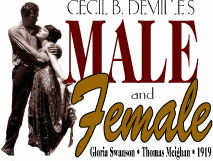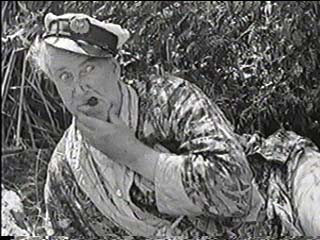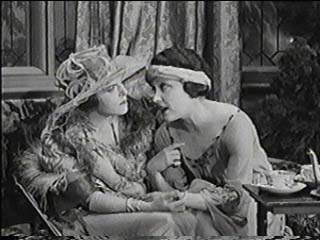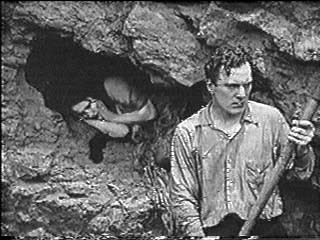

"Male and Female" is mentioned often by silent
film historians and buffs, but usually for reasons other than
being a "great" silent film. The famous bathroom sequence
in all its opulence and elegance is noted quite often. The presence
of both Gloria Swanson and Bebe Daniels early on in their "post-slapstick
comedy" careers is noteworthy. The Babylonian sequence in
which Swanson dangerously allowed a lion to lie across her back
in one scene is a well-known part of silent movie lore. However,
no one points out "Male and Female" as a "must
see" film from the silent era.
Before giving the impression that "Male and Female" is a bad film, it should be pointed out that it is very good entertainment and well worth watching - maybe for the very reasons mentioned above. It offers good fun, too, as the shipwrecked group seek to survive on the island. Theodore Roberts as Lord Loam deserves special honors. His scenes on the island are funny, although all it usually takes is one puzzled look from Roberts' cigar-chewing puss. DeMille should be given some credit for inserting this comic element into the otherwise serious film and doing it subtly and without being too silly.
The story revolves around the lives of two people - Crichton, the butler, and Mary, the eldest daughter in the household where he is employed and the premise that they can never marry because people should stick with their own kind. Since this isn't a very solid premise, even for audiences of 1919, it must be carried out in a manner that takes a tongue-in-cheek look at the staid British class system. Unfortunately, there isn't very much British flavor to the film and there isn't too much "tongue-in-cheek" about the interaction between these people - so we are more likely to view this as a universal story about relationships between the rich and the working class. We find ourselves taking the story more seriously than it should be.
The first third of the film emphasizes the chasm that is
supposed to exist between Crichton's and  Mary's
worlds. She is spoiled to the point of complaining that her toast
is too soft or that her bath water should not be above 90 degrees.
When her friend, Lady Eileen Duncraigie, asks her opinion on a
union between a "lady" and her chauffeur, Mary lets
her know in no uncertain terms, "It's kind to kind, and there's
nothing we can do to change it." Although the viewer is subtly
aware of Crichton's interest in Mary, this incident makes us wonder
how their two worlds could ever come together.
Mary's
worlds. She is spoiled to the point of complaining that her toast
is too soft or that her bath water should not be above 90 degrees.
When her friend, Lady Eileen Duncraigie, asks her opinion on a
union between a "lady" and her chauffeur, Mary lets
her know in no uncertain terms, "It's kind to kind, and there's
nothing we can do to change it." Although the viewer is subtly
aware of Crichton's interest in Mary, this incident makes us wonder
how their two worlds could ever come together.
However, a somewhat unique turn of events makes such a match seem very plausible. The family, along with Crichton and Tweeny, a maid who is in love with Crichton, are shipwrecked on a deserted South Seas island. Having "returned to nature," all men are equal, and the man most able to survive reigns supreme. Since Crichton is the only one capable of coping with the wilds, and it is obvious their survival depends on him, he becomes the "Lord" of the island. The once pampered Loam family now become workers serving their master, Crichton. Mary finds that she has fallen in love with Crichton, and the two plan to marry.
This is the situation after two years on the island, and we can believe this could happen. However, they are soon rescued and must return to London and their former lives. What happens now? Do Crichton and Mary still get married? Do they return to their former lives as if nothing happened?
The ending is somewhat complicated because of the mixed emotions that are stirred within the viewer. Certainly Mary is pampered, rude and spoiled - at least in the beginning. Had she remained that way throughout the film, we would be happy to see her "lose out" in the end. However, in true movie tradition, she has a sweet side underlying that rotten exterior. She "bends" to Crichton's will, works diligently to gain his approval, and, therefore, she succeeds in winning us over.
Then there is Tweeny whom we like from the beginning.  She's innocent and ever faithful and adoring
of Crichton. We are made to feel sympathetic toward Tweeny, too.
For example, when they first arrive on the island, Crichton takes
Mary, places her in a crevice among the rocks and stands guard
to protect her from the leopards. He doesn't even consider Tweeny's
safety. Yet, she takes her underskirt and gives it to him to keep
him warm. As she finds a place among the rocks to rest, she sees
Crichton take the garment and wrap it around Mary to keep her
warm. Very touching and very successful in turning our sympathies
toward Tweeny.
She's innocent and ever faithful and adoring
of Crichton. We are made to feel sympathetic toward Tweeny, too.
For example, when they first arrive on the island, Crichton takes
Mary, places her in a crevice among the rocks and stands guard
to protect her from the leopards. He doesn't even consider Tweeny's
safety. Yet, she takes her underskirt and gives it to him to keep
him warm. As she finds a place among the rocks to rest, she sees
Crichton take the garment and wrap it around Mary to keep her
warm. Very touching and very successful in turning our sympathies
toward Tweeny.
So, although Mary does not endear herself to us in the beginning, she succeeds in doing so before the end of the film, and, from the very beginning, we are sympathetic toward Tweeny. Actually, it is Crichton's character who is the most disconcerting of the three principals in the story.
Basically, it is his inconsistency that disturbs us. He
is a superb butler - handsome, dignified, authoritative and intelligent.
And certainly the fact that he is so capable when they are shipwrecked
on the island while the others are so helpless makes us admire
him even more. However, the incident above, where he ignores Tweeny's
safety from the leopards to guard Mary and even gives Tweeny's
garment to Mary to keep her warm, does not endear him to us. How
inconsiderate! Can we really like someone such as this? Also,
in the end, when he decides a marriage to Mary would be a hopeless
mismatch of classes, he automatically grabs Tweeny by the hand
and announces their upcoming marriage without so much as asking
Tweeny if she will marry him. And we're supposed to "admire"
Crichton?
Could the film have been improved upon? Certainly. Since the time
they spend on the island offers the viewer the most enjoyable
part of the movie, that portion could have been lengthened. By
the same token, the film moves a little slowly in the beginning
as it establishes the pampered lifestyle of the Loam household,
so that could have been shortened somewhat. The bathroom sequence
adds nothing to the plot and could have been deleted (although
some would consider such a cut sacrilege). The Babylonian sequence
adds little to the film, too, other than being visually satisfying.
The business about Crichton being a Babylonian king and Mary a
Christian slave in a former life is weak and has no real bearing
on the plot. The shipwreck is well-done and mildly exciting, although
one can't help but wonder whatever happened to the crew.
The version viewed is from TCM and was produced for video by David Shepard with a music score by Sydney Jill Lehman. The picture quality is excellent, and the music score is very appropriate.